2026年中考《英语》复习课件:专题二 第4讲 Units 1~3 (共60张PPT)
文档属性
| 名称 | 2026年中考《英语》复习课件:专题二 第4讲 Units 1~3 (共60张PPT) | 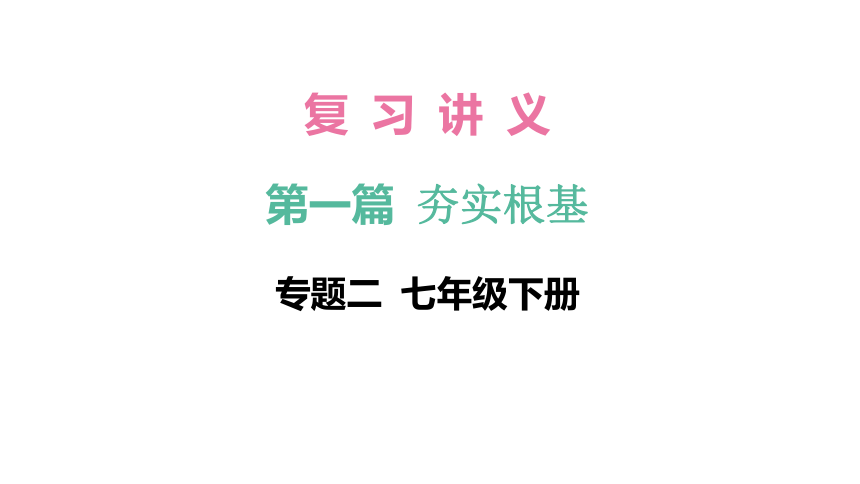 | |
| 格式 | pptx | ||
| 文件大小 | 467.1KB | ||
| 资源类型 | 教案 | ||
| 版本资源 | 人教新目标(Go for it)版 | ||
| 科目 | 英语 | ||
| 更新时间 | 2025-07-17 10:45:50 | ||
图片预览

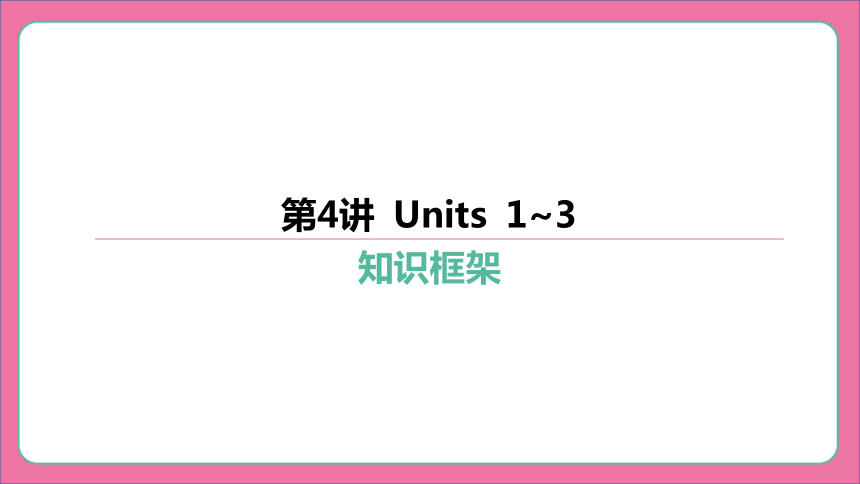
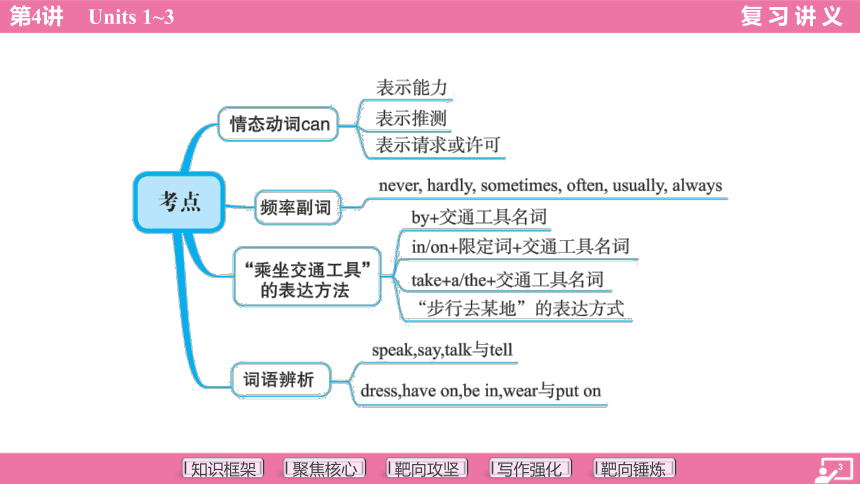
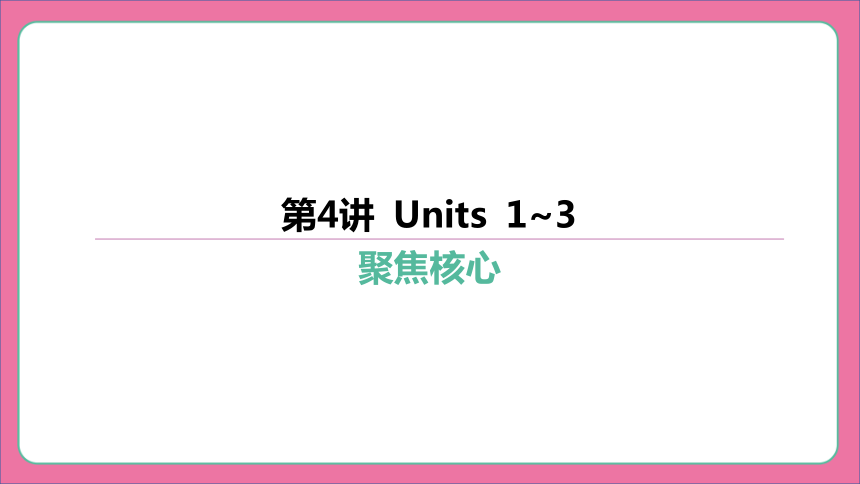
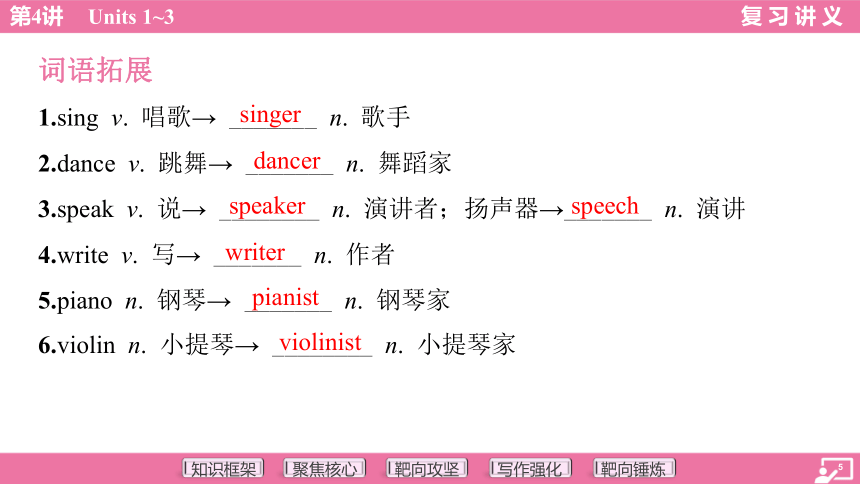
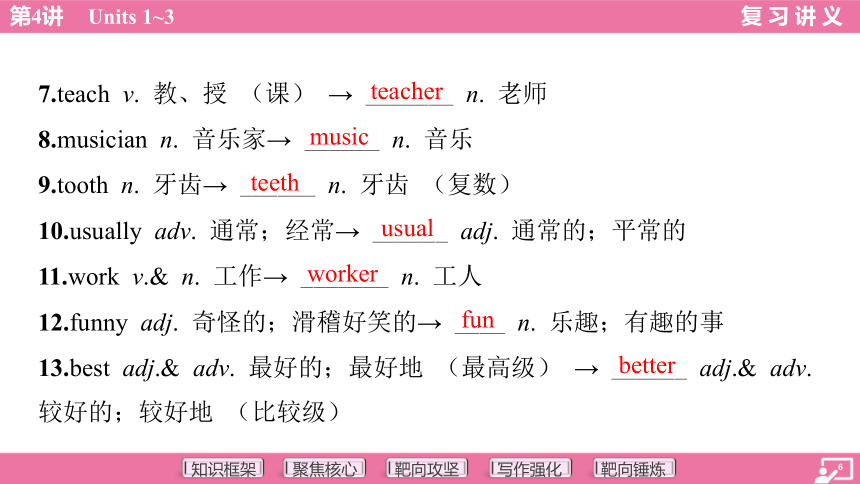
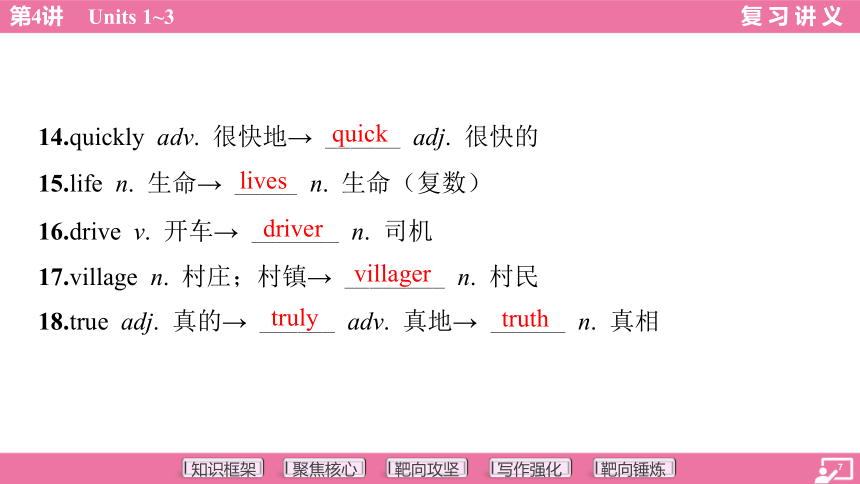
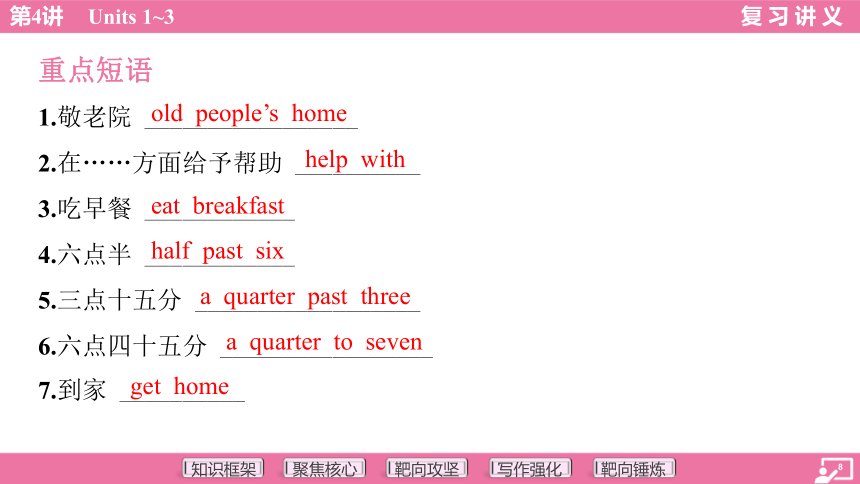
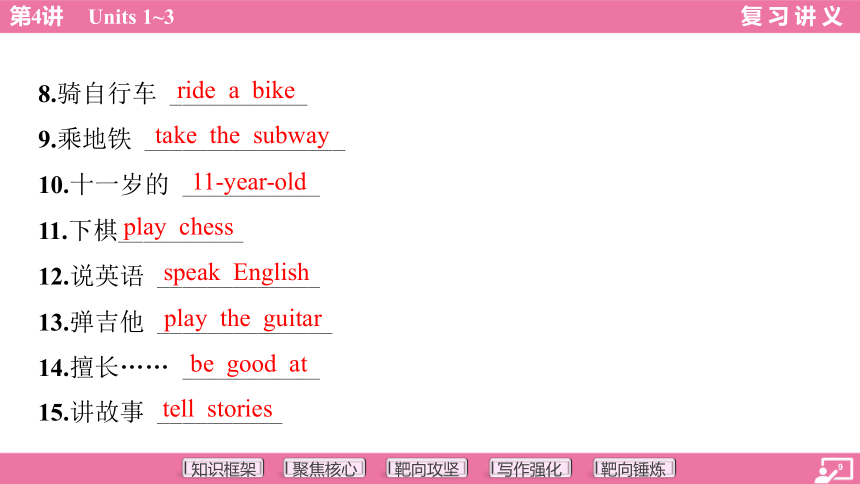
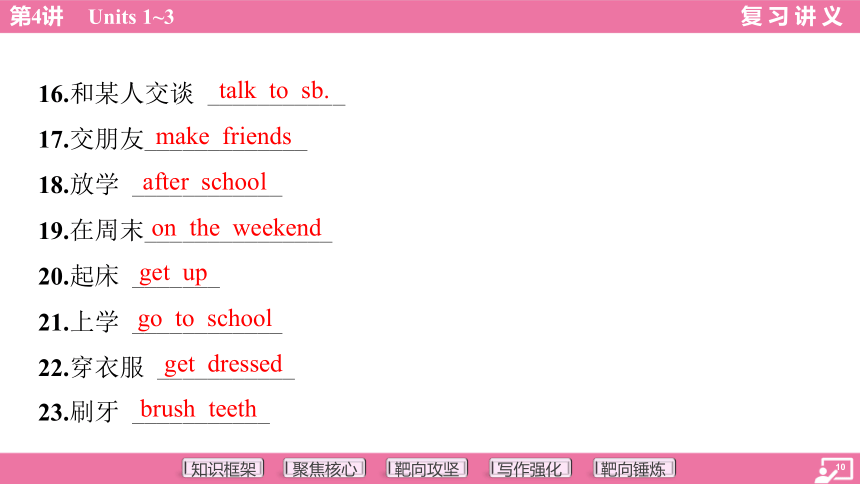
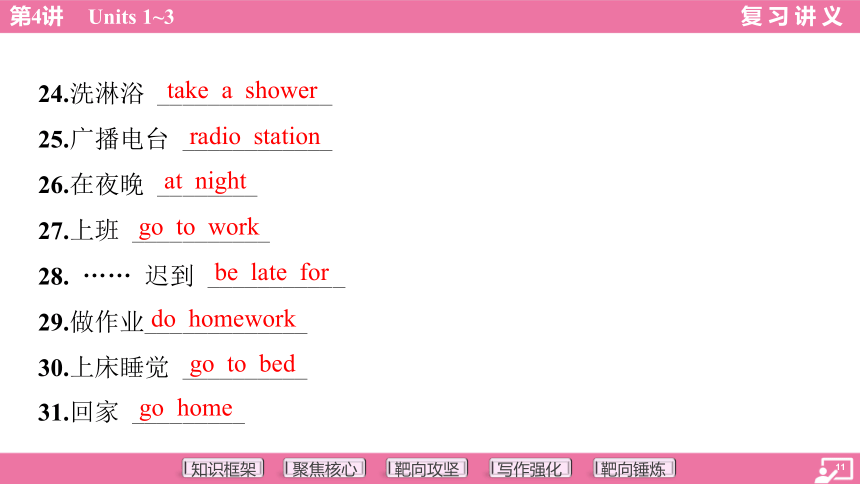
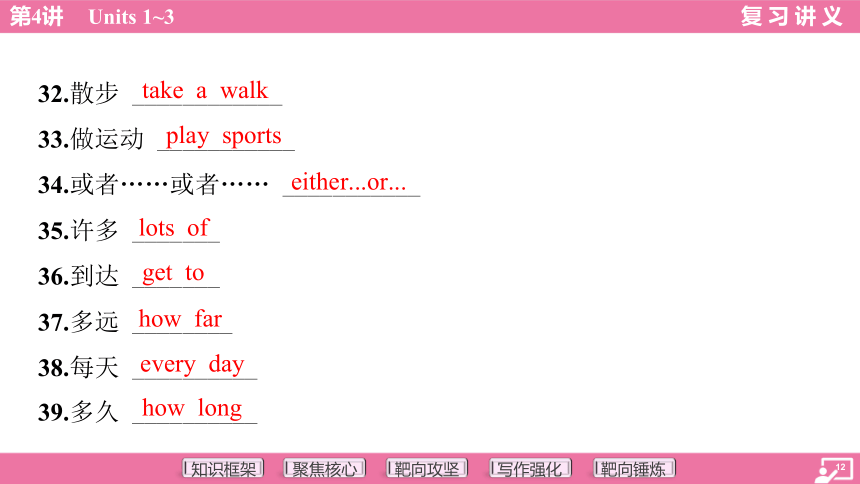
文档简介
(共60张PPT)
复 习 讲 义
第一篇 夯实根基
专题二 七年级下册
第4讲 Units 1~3
知识框架
第4讲 Units 1~3
聚焦核心
词语拓展
1.sing v. 唱歌→ _______ n. 歌手
2.dance v. 跳舞→ _______ n. 舞蹈家
3.speak v. 说→ ________ n. 演讲者;扬声器→_______ n. 演讲
4.write v. 写→ _______ n. 作者
5.piano n. 钢琴→ _______ n. 钢琴家
6.violin n. 小提琴→ ________ n. 小提琴家
singer
dancer
speaker
speech
writer
pianist
violinist
7.teach v. 教、授 (课) → _______ n. 老师
8.musician n. 音乐家→ ______ n. 音乐
9.tooth n. 牙齿→ ______ n. 牙齿 (复数)
10.usually adv. 通常;经常→ ______ adj. 通常的;平常的
11.work v.& n. 工作→ _______ n. 工人
12.funny adj. 奇怪的;滑稽好笑的→ ____ n. 乐趣;有趣的事
13.best adj.& adv. 最好的;最好地 (最高级) → ______ adj.& adv.
较好的;较好地 (比较级)
teacher
music
teeth
usual
worker
fun
better
14.quickly adv. 很快地→ ______ adj. 很快的
quick
15.life n. 生命→ _____ n. 生命(复数)
lives
16.drive v. 开车→ _______ n. 司机
17.village n. 村庄;村镇→ ________ n. 村民
18.true adj. 真的→ ______ adv. 真地→ ______ n. 真相
driver
villager
truly
truth
重点短语
1.敬老院 _________________
2.在……方面给予帮助 __________
3.吃早餐 ____________
4.六点半 ____________
5.三点十五分 __________________
6.六点四十五分 _________________
7.到家 __________
old people’s home
help with
eat breakfast
half past six
a quarter past three
a quarter to seven
get home
8.骑自行车 ___________
9.乘地铁 ________________
10.十一岁的 ___________
11.下棋__________
12.说英语 _____________
13.弹吉他 ______________
14.擅长…… ___________
15.讲故事 __________
ride a bike
take the subway
11-year-old
play chess
speak English
play the guitar
be good at
tell stories
16.和某人交谈 ___________
17.交朋友_____________
18.放学 ____________
19.在周末_______________
20.起床 _______
21.上学 ____________
22.穿衣服 ___________
23.刷牙 ___________
talk to sb.
make friends
after school
on the weekend
get up
go to school
get dressed
brush teeth
24.洗淋浴 ______________
25.广播电台 ____________
26.在夜晚 ________
27.上班 ___________
28. …… 迟到 ___________
29.做作业_____________
30.上床睡觉 __________
31.回家 _________
take a shower
radio station
at night
go to work
be late for
do homework
go to bed
go home
32.散步 ____________
33.做运动 ___________
34.或者……或者…… ___________
35.许多 _______
36.到达 _______
37.多远 ________
38.每天 __________
39.多久 __________
take a walk
play sports
either...or...
lots of
get to
how far
every day
how long
40.坐公共汽车 ________
41.地铁站 __________________
42.认为 _________
43.在……与……之间 ______________
44.过河 ______________
45.实现 __________
46.不得不 ________
by bus
the subway station
think of
between...and...
cross the river
come true
have to
重点句型
Unit 1
1.—Can you swim
—Yes, I can./No, I can’t. (P1)
——你会游泳吗?
——是的,我会。/不,我不会。
2.You’re very good at telling stories. (P2)
你很擅长讲故事。
3.—What club do you want to join
—We want to join the chess club. (P3)
——你们想参加什么社团
——我们想参加象棋社团。
Unit 2
4.—What time do you usually get up, Rick
—I usually get up at six thirty. (P7)
——里克, 你通常几点起床?
——我通常六点半起床。
5.—When does Scott go to work
—He always goes to work at eleven o’clock. (P9)
——斯科特什么时候去上班?
——他总是十一点去上班。
6.Anna never eats breakfast. (P9)
安娜从不吃早饭。
7.After school, I sometimes play basketball for half an hour.
(P11)
放学后,我有时候打半个小时的篮球。
Unit 3
8.—How do you get to school
—I ride my bike. (P13)
——你怎样到学校?
——我骑自行车。
9.—How long does it take to get to school
—It takes about 15 minutes. (P15)
——到学校要花多长时间?
——大概15分钟。
10.—How far is it from your home to school
—It’s only about two kilometers. (P15)
——从你家到学校有多远?
——只有大约两千米。
第4讲 Units 1~3
靶向攻坚
考点1 情态动词can。
1.表示能力,意为“能,会”,否定形式为can’t。例如:
The girl can speak English very well.这个女孩英语说得很好。
2.表示推测,意为“可能”,常用于疑问句或否定句中。例如:
He can’t be Tony because he doesn’t wear glasses. 他不可能是托
尼,因为他没有戴眼镜。
3.表示请求或许可。例如:
Can I borrow your umbrella 我能借你的雨伞吗?
4.对can的一般疑问句的回答,可以根据其含义的不同而改变。
(1) 对询问能力的回答可用 “Yes, 主语+can.”或 “No, 主语
+can’t.”。例如:
—Can you dance 你会跳舞吗?
—Yes, I can. 是的,我会。/No, I can’t. 不, 我不会。
(2) 对表示请求或许可的回答可以用 “OK./All right./Sorry, you
can’t./Sorry, I’m afraid I can’t.”等。例如:
—Can you come to my birthday party 你能参加我的生日宴会吗?
—Sorry, I’m afraid I can’t. 对不起,恐怕我不能。
考点精练
1.—Can Betty play tennis
—________ So she wants you to teach her.( )
C
A.Yes, she can. B.No, she can. C.No, she can’t.
2.—Could I use your eraser for a while
—Yes, of course you ________.( )
B
A.could B.can C.will
考点2 频率副词。
频率副词在句中作状语,一般位于实义动词之前、系动词或助动词
之后。几个常用的频率副词表示的频率高低见下图:
考点精练
1.—Do you like Sichuan food
—No, I hate hot food. I ________ eat Sichuan food.( )
C
A.always B.usually C.never
2.Kate is ________ happy. She has a lot of joy.( )
A
A.always B.seldom C.never
考点3 “乘坐交通工具”的表达方法。
1.用“by+交通工具名词”。此时表示交通工具的名词只能用单数,也
不能被冠词或物主代词等限定词修饰。例如:
They often go home by bus.他们经常坐公共汽车回家。
2.用“in(on)+限定词+交通工具名词”。此时交通工具名词前必须
有冠词、名词所有格形式或形容词性物主代词等限定词修饰。其用法与
“by+交通工具名词”相似。例如:
He often goes to school on his bike.他经常骑自行车去上学。
3.用“take a(the)+交通工具名词”。如take a bus(乘公共汽车),
take a train(乘火车),take a ship(乘轮船),take a plane
(乘飞机);但“骑自行车”要用 ride a bike来表示。例如:
I often ride a bike to school.我经常骑自行车去学校。
4.表示“步行去某地”,可用下列两种句式:
(1)go to +某地+ on foot
(2)walk to +某地
例如:
She goes to her office on foot every day.
= She walks to her office every day.
她每天步行去办公室。
考点精练
1.Let’s go home ____ _____ (乘公共汽车) quickly. The basketball
game is at 7:00 pm.
2.I’m going to go to school ____ _____ (步行) this term.
by
bus
on
foot
考点4 speak, say, talk和tell的用法区别。
单词 词义 区 别 例 句
speak 说话, 讲话 作不及物动词时,强调开 始说话、发言的动作;作 及物动词时,其后的宾语 为某种语言 Would you like to speak at
the meeting 你要在会上发言吗 He speaks Chinese quite well.他汉语说得相当好。
单词 词义 区 别 例 句
say 说出, 说过 强调说话的内容,指有连 贯性的说话,宾语多为所 讲的内容。有时say也与to连用,构成say to sb., 表示“对某人说……” I can say it in English.我能
用英语说出它。I often say
“hello” to her with a smile.我经常笑着向她问好。
续表
单词 词义 区 别 例 句
talk 谈话, 谈论 强调双方之间的谈话,一 般用作不及物动词,常与 介词to或with连用,表示 “与……交谈”。表示谈 及某人或者某事的时候, 后接介词of或about My mother wants me to be confident when I talk with foreigners.我妈妈希望我和外国人谈话时自信一些。What are they talking about 他们正在谈论什么呢
续表
单词 词义 区 别 例 句
tell 讲述, 告诉 指把一件事情传达给别 人或讲述一件事情、一 个故事等,常作及物动词,后面接复合宾语。常用于以下结构:tell sb. sth. “告诉某人某事”, Please tell us something about yourself. 请告诉我们关于你自己的一些事情。Dad often tells me to save water in our daily life. 爸爸经常告诉我在日常生活中要节约用水。
续表
单词 词义 区 别 例 句
tell 讲述, 告诉 tell sb. about sth. “告诉某人关于某事”,tell sb. (not) to do sth.“告诉某人(不要)去做某事” Mum told me not to ride a
bike quickly. It’s too
dangerous. 妈妈告诉我不要骑自行车骑得太快,那太危险
了。
续表
考点精练
speak talk tell say
1.We are _______ about the new movie.
2.She can ______ four languages.
3.Please ____ it in English.
4.My grandpa often _____ us some interesting stories.
talking
speak
say
tells
考点5 dress, have on, be in, wear和put on的用法区别。
词语 词义 区 别 例 句
dress 穿着, 打扮 可作及物动词,宾语通常是 人或反身代词。常用于被动 语态,但只用于穿衣。它既表 示动作,又表示状态。常用于 下列结构:dress sb./oneself (给某人穿衣服), dress well和be dressed in等 She always dresses
well.她总是打扮得很漂亮。Jim isn’t old
enough to dress
himself.吉姆太小,还
不能给自己穿衣服。
Mary is dressing her
doll. 玛丽正在给她的
布娃娃穿衣服。
词语 词义 区 别 例 句
have on 穿着 指穿的状态, 和wear类似,但have on不用于进行时态 She has a red skirt
on. (= She’s wearing a red skirt.)她穿着红
裙子。
be in 穿着, 戴着 “be in+表示颜色或衣服的 词”,是系表结构,强调“穿 着,戴着”的状态 The girl in white is
my best friend.穿着白色衣服的女孩是我最好的朋友。
续表
词语 词义 区 别 例 句
wear 穿着, 戴着 表示状态,可用于穿衣、穿 鞋、戴帽子、戴手套、佩戴 首饰等,强调状态 I don’t wear glasses. 我不戴眼镜。The man whom I served was wearing a suit. 我接待的那位男士当时穿着西装。
续表
词语 词义 区 别 例 句
put on 戴上, 穿上 表示穿衣服等的动作,其反义词是take off Put on your clothes.
穿上你的衣服。Would you put on your hat, please 请把你的帽子戴上好吗?
续表
考点精练
put on wear dress in
1.She likes to ______ up for a party.
2.The girl ___ red is my sister.
3.He often ______ a white T-shirt.
4.She is __________ her blue coat.
dress
in
wears
putting on
第4讲 Units 1~3
写作强化
主题:日常生活
写作强化
在今天的英语课上,你们班举行了“我的幸福家庭”主题分享会。假
如你是组长李华,请你根据以下内容,写一篇90词左右的英语短文,向
全班汇报你们小组四人的分享内容,需包括以下要点。
Theme My Happy Family Name Family activity Benefits (好处)
Kate do some reading 1.能让人变得更聪明;
2. ……
Ben do the housework 1.变得更有责任感;学会照顾别人;
2. ……
Emily Do sports 1.变得健康和强壮;
2. ……
你 (请补充) (请补充)
My Happy Family
Last week, a sharing was held in our class. The theme was “My
Happy Family”. Our group members shared their family activities. Here
are the results.
In Kate’s family, they enjoy reading. They usually do some
reading in their spare time. They believe reading makes them smart.
What’s more, reading helps them relax themselves. Ben and his family
usually do the housework together. Doing housework makes them more
responsible and they learn to take care of others. Besides, living in a
clean and tidy house makes them happier. Emily and her family often
do sports together. Exercise not only makes them healthy and strong,
but they have made many friends by doing it. As for me, my family
and I often do volunteer work on weekends. It is meaningful to help
people in need.
We all have a happy family and colorful family activities.
审题谋篇
审主题 日常生活
审人称 第三人称
审时态 一般现在时
审要点: ① 三个家庭的活动及好处
② “我”自己家庭的活动及好处
审结构 开篇:介绍分享活动的主题及结果
中间:结合表格提示,具体介绍组内成员的家庭活动及好处
结尾:总结全文
常用词句 [词语]
do some reading,relax oneself,take care of
[句型]
①Exercise not only makes them healthy and strong, but they have made many friends by doing it.
②It is meaningful to help people in need.
续表
第4讲 Units 1~3
靶向锤炼
一、单项选择。
1.David does ________ sports for half ________ hour in the
morning.( )
B
A.the; a B.\; an C.\; a
2.—Is your sister good ________ her students
—Yes. She’s good ________ telling stories. All the students like
her.( )
A
A.with; at B.with; with C.at; at
3.—Jim, can you ________ it in English
—Sorry, I can’t ________ English.( )
A
A.say; speak B.say; say C.speak; say
4.—Do you go to school by bike ________ by bus
—By bike.( )
B
A.and B.or C.but
5.Bill gets a new ________ in a middle school and he has much
________ to do every day.( )
C
A.job; job B.work; work C.job; work
6.—Peter, ________ and then play basketball with me.
—OK, Dad, but I can’t find my clothes.( )
A
A.get dressed B.make dinner C.make friends
7.—Paul is very fat.
—Yes, he ________ plays sports and he eats too much.( )
B
A.always B.never C.usually
8.These strawberries ________ good. I want to buy some.( )
A
A.taste B.tastes C.sound
9.—How can we ________ the river
—By boat.( )
C
A.clean B.show C.cross
10.—We can join the story telling club.
—________I like telling stories.( )
C
A.See you. B.Thank you. C.Sounds good.
二、用括号内所给单词的正确形式填空。
1.Let’s _____ (join) the chess club, Grace!
2.Three people lost their _____ (life)in that accident.
3.Uncle Tom wants to buy two _______(guitar) for my brother and
me.
4.Scott ______ (walk)to work from Monday to Friday. He thinks
it’s healthy.
5.The ice-cream in the box tastes ______(well).
6.These _________ (villager) don’t have jobs. Dave wants to help
them.a
join
lives
guitars
walks
good
villagers
7.These new ______ (bike)are on sale. How about buying one for
your daughter
8.The first train _______(leave) at 6:30 am every day.
9.They are all __________(music). Jack can play the guitar, Peter
can play the piano, and Zhao Guang can play the erhu.
bikes
leaves
musicians
10.—Can you ______ (drive)me to the train station
—Sure. Let’s go.
drive
三、从方框中选择恰当的单词,并用其正确形式填空。每个单
词只能用一次。
games boy make teach can
plays club pass or watch
Howard is a fat boy. He doesn’t like sports, and he can’t play
chess 1.___ the piano. But Howard wants to be healthy and 2.______
some friends. He knows the school soccer 3._____ needs some boys.
Howard doesn’t play soccer, but he 4.________ it on TV at home.
Howard has three weeks to prepare for the tryout.
or
make
club
watches
Howard watches soccer 5._______ on TV for half an hour every
day. He buys a soccer ball and 6.______ it after school. He asks his
dad to 7.______ him, too. Howard feels like he is a great soccer
player! He goes to the tryout. There are about fifty 8.______ there.
Howard is nervous. Because they all look like they 9.____ play soccer
well.
These boys must play a game for the tryout. A boy 10._______
the ball to Howard. Then Howard kicks the ball and scores a goal. He
makes it! He can join the soccer club!
games
plays
teach
boys
can
passes
games boy make teach can
plays club pass or watch
四、阅读理解。
Bonk has a dream about a bike. He often sees it on TV and in
newspapers. “I have to make some money for it,” says Bonk. And he
has a good idea.
On Saturday, Bonk goes door to door and asks people if they
need dog walking. His friends Jupe, Lurk, Uzzle come to help him.
But Bonk says, “I’ll do it myself. I’m making money for my new
bike.”
Many people come to Bonk. “This is really an easy way to make
money,” says Bonk. On Sunday, Bonk picks up all the dogs. They
jump and run here and there. It’s a difficult job for the little boy.
Soon he is exhausted.
Jupe, Lurk, Uzzle ride scooters (滑板车) to Bonk. “Do you
want some help now ” Bonk gives each of them a dog to walk.
It is about 11:00 am The boys finish walking the dogs. The dog
owners give each of them some money. Jupe, Lurk, Uzzle give their
money to Bonk. “This is for your new bike. We hope you can get
your dream bike.”
根据短文内容,选择正确答案。
1.What does Bonk want to buy ( )
B
A.A TV. B.A bike. C.A dog.
2.Bonk wants to ________ to make some money.( )
A
A.walk dogs B.clean rooms C.sell scooters
3.The underlined word “exhausted” in Paragraph 3 means “ ________”
in Chinese.( )
B
A.目中无人的 B.筋疲力尽的 C.兴奋不已的
4.When does Bonk get the money ( )
C
A.On Saturday morning.
B.On Saturday evening.
C.On Sunday morning.
5.What do you think of Jupe, Lurk and Uzzle ( )
C
A.Boring. B.Funny. C.Nice.
复 习 讲 义
第一篇 夯实根基
专题二 七年级下册
第4讲 Units 1~3
知识框架
第4讲 Units 1~3
聚焦核心
词语拓展
1.sing v. 唱歌→ _______ n. 歌手
2.dance v. 跳舞→ _______ n. 舞蹈家
3.speak v. 说→ ________ n. 演讲者;扬声器→_______ n. 演讲
4.write v. 写→ _______ n. 作者
5.piano n. 钢琴→ _______ n. 钢琴家
6.violin n. 小提琴→ ________ n. 小提琴家
singer
dancer
speaker
speech
writer
pianist
violinist
7.teach v. 教、授 (课) → _______ n. 老师
8.musician n. 音乐家→ ______ n. 音乐
9.tooth n. 牙齿→ ______ n. 牙齿 (复数)
10.usually adv. 通常;经常→ ______ adj. 通常的;平常的
11.work v.& n. 工作→ _______ n. 工人
12.funny adj. 奇怪的;滑稽好笑的→ ____ n. 乐趣;有趣的事
13.best adj.& adv. 最好的;最好地 (最高级) → ______ adj.& adv.
较好的;较好地 (比较级)
teacher
music
teeth
usual
worker
fun
better
14.quickly adv. 很快地→ ______ adj. 很快的
quick
15.life n. 生命→ _____ n. 生命(复数)
lives
16.drive v. 开车→ _______ n. 司机
17.village n. 村庄;村镇→ ________ n. 村民
18.true adj. 真的→ ______ adv. 真地→ ______ n. 真相
driver
villager
truly
truth
重点短语
1.敬老院 _________________
2.在……方面给予帮助 __________
3.吃早餐 ____________
4.六点半 ____________
5.三点十五分 __________________
6.六点四十五分 _________________
7.到家 __________
old people’s home
help with
eat breakfast
half past six
a quarter past three
a quarter to seven
get home
8.骑自行车 ___________
9.乘地铁 ________________
10.十一岁的 ___________
11.下棋__________
12.说英语 _____________
13.弹吉他 ______________
14.擅长…… ___________
15.讲故事 __________
ride a bike
take the subway
11-year-old
play chess
speak English
play the guitar
be good at
tell stories
16.和某人交谈 ___________
17.交朋友_____________
18.放学 ____________
19.在周末_______________
20.起床 _______
21.上学 ____________
22.穿衣服 ___________
23.刷牙 ___________
talk to sb.
make friends
after school
on the weekend
get up
go to school
get dressed
brush teeth
24.洗淋浴 ______________
25.广播电台 ____________
26.在夜晚 ________
27.上班 ___________
28. …… 迟到 ___________
29.做作业_____________
30.上床睡觉 __________
31.回家 _________
take a shower
radio station
at night
go to work
be late for
do homework
go to bed
go home
32.散步 ____________
33.做运动 ___________
34.或者……或者…… ___________
35.许多 _______
36.到达 _______
37.多远 ________
38.每天 __________
39.多久 __________
take a walk
play sports
either...or...
lots of
get to
how far
every day
how long
40.坐公共汽车 ________
41.地铁站 __________________
42.认为 _________
43.在……与……之间 ______________
44.过河 ______________
45.实现 __________
46.不得不 ________
by bus
the subway station
think of
between...and...
cross the river
come true
have to
重点句型
Unit 1
1.—Can you swim
—Yes, I can./No, I can’t. (P1)
——你会游泳吗?
——是的,我会。/不,我不会。
2.You’re very good at telling stories. (P2)
你很擅长讲故事。
3.—What club do you want to join
—We want to join the chess club. (P3)
——你们想参加什么社团
——我们想参加象棋社团。
Unit 2
4.—What time do you usually get up, Rick
—I usually get up at six thirty. (P7)
——里克, 你通常几点起床?
——我通常六点半起床。
5.—When does Scott go to work
—He always goes to work at eleven o’clock. (P9)
——斯科特什么时候去上班?
——他总是十一点去上班。
6.Anna never eats breakfast. (P9)
安娜从不吃早饭。
7.After school, I sometimes play basketball for half an hour.
(P11)
放学后,我有时候打半个小时的篮球。
Unit 3
8.—How do you get to school
—I ride my bike. (P13)
——你怎样到学校?
——我骑自行车。
9.—How long does it take to get to school
—It takes about 15 minutes. (P15)
——到学校要花多长时间?
——大概15分钟。
10.—How far is it from your home to school
—It’s only about two kilometers. (P15)
——从你家到学校有多远?
——只有大约两千米。
第4讲 Units 1~3
靶向攻坚
考点1 情态动词can。
1.表示能力,意为“能,会”,否定形式为can’t。例如:
The girl can speak English very well.这个女孩英语说得很好。
2.表示推测,意为“可能”,常用于疑问句或否定句中。例如:
He can’t be Tony because he doesn’t wear glasses. 他不可能是托
尼,因为他没有戴眼镜。
3.表示请求或许可。例如:
Can I borrow your umbrella 我能借你的雨伞吗?
4.对can的一般疑问句的回答,可以根据其含义的不同而改变。
(1) 对询问能力的回答可用 “Yes, 主语+can.”或 “No, 主语
+can’t.”。例如:
—Can you dance 你会跳舞吗?
—Yes, I can. 是的,我会。/No, I can’t. 不, 我不会。
(2) 对表示请求或许可的回答可以用 “OK./All right./Sorry, you
can’t./Sorry, I’m afraid I can’t.”等。例如:
—Can you come to my birthday party 你能参加我的生日宴会吗?
—Sorry, I’m afraid I can’t. 对不起,恐怕我不能。
考点精练
1.—Can Betty play tennis
—________ So she wants you to teach her.( )
C
A.Yes, she can. B.No, she can. C.No, she can’t.
2.—Could I use your eraser for a while
—Yes, of course you ________.( )
B
A.could B.can C.will
考点2 频率副词。
频率副词在句中作状语,一般位于实义动词之前、系动词或助动词
之后。几个常用的频率副词表示的频率高低见下图:
考点精练
1.—Do you like Sichuan food
—No, I hate hot food. I ________ eat Sichuan food.( )
C
A.always B.usually C.never
2.Kate is ________ happy. She has a lot of joy.( )
A
A.always B.seldom C.never
考点3 “乘坐交通工具”的表达方法。
1.用“by+交通工具名词”。此时表示交通工具的名词只能用单数,也
不能被冠词或物主代词等限定词修饰。例如:
They often go home by bus.他们经常坐公共汽车回家。
2.用“in(on)+限定词+交通工具名词”。此时交通工具名词前必须
有冠词、名词所有格形式或形容词性物主代词等限定词修饰。其用法与
“by+交通工具名词”相似。例如:
He often goes to school on his bike.他经常骑自行车去上学。
3.用“take a(the)+交通工具名词”。如take a bus(乘公共汽车),
take a train(乘火车),take a ship(乘轮船),take a plane
(乘飞机);但“骑自行车”要用 ride a bike来表示。例如:
I often ride a bike to school.我经常骑自行车去学校。
4.表示“步行去某地”,可用下列两种句式:
(1)go to +某地+ on foot
(2)walk to +某地
例如:
She goes to her office on foot every day.
= She walks to her office every day.
她每天步行去办公室。
考点精练
1.Let’s go home ____ _____ (乘公共汽车) quickly. The basketball
game is at 7:00 pm.
2.I’m going to go to school ____ _____ (步行) this term.
by
bus
on
foot
考点4 speak, say, talk和tell的用法区别。
单词 词义 区 别 例 句
speak 说话, 讲话 作不及物动词时,强调开 始说话、发言的动作;作 及物动词时,其后的宾语 为某种语言 Would you like to speak at
the meeting 你要在会上发言吗 He speaks Chinese quite well.他汉语说得相当好。
单词 词义 区 别 例 句
say 说出, 说过 强调说话的内容,指有连 贯性的说话,宾语多为所 讲的内容。有时say也与to连用,构成say to sb., 表示“对某人说……” I can say it in English.我能
用英语说出它。I often say
“hello” to her with a smile.我经常笑着向她问好。
续表
单词 词义 区 别 例 句
talk 谈话, 谈论 强调双方之间的谈话,一 般用作不及物动词,常与 介词to或with连用,表示 “与……交谈”。表示谈 及某人或者某事的时候, 后接介词of或about My mother wants me to be confident when I talk with foreigners.我妈妈希望我和外国人谈话时自信一些。What are they talking about 他们正在谈论什么呢
续表
单词 词义 区 别 例 句
tell 讲述, 告诉 指把一件事情传达给别 人或讲述一件事情、一 个故事等,常作及物动词,后面接复合宾语。常用于以下结构:tell sb. sth. “告诉某人某事”, Please tell us something about yourself. 请告诉我们关于你自己的一些事情。Dad often tells me to save water in our daily life. 爸爸经常告诉我在日常生活中要节约用水。
续表
单词 词义 区 别 例 句
tell 讲述, 告诉 tell sb. about sth. “告诉某人关于某事”,tell sb. (not) to do sth.“告诉某人(不要)去做某事” Mum told me not to ride a
bike quickly. It’s too
dangerous. 妈妈告诉我不要骑自行车骑得太快,那太危险
了。
续表
考点精练
speak talk tell say
1.We are _______ about the new movie.
2.She can ______ four languages.
3.Please ____ it in English.
4.My grandpa often _____ us some interesting stories.
talking
speak
say
tells
考点5 dress, have on, be in, wear和put on的用法区别。
词语 词义 区 别 例 句
dress 穿着, 打扮 可作及物动词,宾语通常是 人或反身代词。常用于被动 语态,但只用于穿衣。它既表 示动作,又表示状态。常用于 下列结构:dress sb./oneself (给某人穿衣服), dress well和be dressed in等 She always dresses
well.她总是打扮得很漂亮。Jim isn’t old
enough to dress
himself.吉姆太小,还
不能给自己穿衣服。
Mary is dressing her
doll. 玛丽正在给她的
布娃娃穿衣服。
词语 词义 区 别 例 句
have on 穿着 指穿的状态, 和wear类似,但have on不用于进行时态 She has a red skirt
on. (= She’s wearing a red skirt.)她穿着红
裙子。
be in 穿着, 戴着 “be in+表示颜色或衣服的 词”,是系表结构,强调“穿 着,戴着”的状态 The girl in white is
my best friend.穿着白色衣服的女孩是我最好的朋友。
续表
词语 词义 区 别 例 句
wear 穿着, 戴着 表示状态,可用于穿衣、穿 鞋、戴帽子、戴手套、佩戴 首饰等,强调状态 I don’t wear glasses. 我不戴眼镜。The man whom I served was wearing a suit. 我接待的那位男士当时穿着西装。
续表
词语 词义 区 别 例 句
put on 戴上, 穿上 表示穿衣服等的动作,其反义词是take off Put on your clothes.
穿上你的衣服。Would you put on your hat, please 请把你的帽子戴上好吗?
续表
考点精练
put on wear dress in
1.She likes to ______ up for a party.
2.The girl ___ red is my sister.
3.He often ______ a white T-shirt.
4.She is __________ her blue coat.
dress
in
wears
putting on
第4讲 Units 1~3
写作强化
主题:日常生活
写作强化
在今天的英语课上,你们班举行了“我的幸福家庭”主题分享会。假
如你是组长李华,请你根据以下内容,写一篇90词左右的英语短文,向
全班汇报你们小组四人的分享内容,需包括以下要点。
Theme My Happy Family Name Family activity Benefits (好处)
Kate do some reading 1.能让人变得更聪明;
2. ……
Ben do the housework 1.变得更有责任感;学会照顾别人;
2. ……
Emily Do sports 1.变得健康和强壮;
2. ……
你 (请补充) (请补充)
My Happy Family
Last week, a sharing was held in our class. The theme was “My
Happy Family”. Our group members shared their family activities. Here
are the results.
In Kate’s family, they enjoy reading. They usually do some
reading in their spare time. They believe reading makes them smart.
What’s more, reading helps them relax themselves. Ben and his family
usually do the housework together. Doing housework makes them more
responsible and they learn to take care of others. Besides, living in a
clean and tidy house makes them happier. Emily and her family often
do sports together. Exercise not only makes them healthy and strong,
but they have made many friends by doing it. As for me, my family
and I often do volunteer work on weekends. It is meaningful to help
people in need.
We all have a happy family and colorful family activities.
审题谋篇
审主题 日常生活
审人称 第三人称
审时态 一般现在时
审要点: ① 三个家庭的活动及好处
② “我”自己家庭的活动及好处
审结构 开篇:介绍分享活动的主题及结果
中间:结合表格提示,具体介绍组内成员的家庭活动及好处
结尾:总结全文
常用词句 [词语]
do some reading,relax oneself,take care of
[句型]
①Exercise not only makes them healthy and strong, but they have made many friends by doing it.
②It is meaningful to help people in need.
续表
第4讲 Units 1~3
靶向锤炼
一、单项选择。
1.David does ________ sports for half ________ hour in the
morning.( )
B
A.the; a B.\; an C.\; a
2.—Is your sister good ________ her students
—Yes. She’s good ________ telling stories. All the students like
her.( )
A
A.with; at B.with; with C.at; at
3.—Jim, can you ________ it in English
—Sorry, I can’t ________ English.( )
A
A.say; speak B.say; say C.speak; say
4.—Do you go to school by bike ________ by bus
—By bike.( )
B
A.and B.or C.but
5.Bill gets a new ________ in a middle school and he has much
________ to do every day.( )
C
A.job; job B.work; work C.job; work
6.—Peter, ________ and then play basketball with me.
—OK, Dad, but I can’t find my clothes.( )
A
A.get dressed B.make dinner C.make friends
7.—Paul is very fat.
—Yes, he ________ plays sports and he eats too much.( )
B
A.always B.never C.usually
8.These strawberries ________ good. I want to buy some.( )
A
A.taste B.tastes C.sound
9.—How can we ________ the river
—By boat.( )
C
A.clean B.show C.cross
10.—We can join the story telling club.
—________I like telling stories.( )
C
A.See you. B.Thank you. C.Sounds good.
二、用括号内所给单词的正确形式填空。
1.Let’s _____ (join) the chess club, Grace!
2.Three people lost their _____ (life)in that accident.
3.Uncle Tom wants to buy two _______(guitar) for my brother and
me.
4.Scott ______ (walk)to work from Monday to Friday. He thinks
it’s healthy.
5.The ice-cream in the box tastes ______(well).
6.These _________ (villager) don’t have jobs. Dave wants to help
them.a
join
lives
guitars
walks
good
villagers
7.These new ______ (bike)are on sale. How about buying one for
your daughter
8.The first train _______(leave) at 6:30 am every day.
9.They are all __________(music). Jack can play the guitar, Peter
can play the piano, and Zhao Guang can play the erhu.
bikes
leaves
musicians
10.—Can you ______ (drive)me to the train station
—Sure. Let’s go.
drive
三、从方框中选择恰当的单词,并用其正确形式填空。每个单
词只能用一次。
games boy make teach can
plays club pass or watch
Howard is a fat boy. He doesn’t like sports, and he can’t play
chess 1.___ the piano. But Howard wants to be healthy and 2.______
some friends. He knows the school soccer 3._____ needs some boys.
Howard doesn’t play soccer, but he 4.________ it on TV at home.
Howard has three weeks to prepare for the tryout.
or
make
club
watches
Howard watches soccer 5._______ on TV for half an hour every
day. He buys a soccer ball and 6.______ it after school. He asks his
dad to 7.______ him, too. Howard feels like he is a great soccer
player! He goes to the tryout. There are about fifty 8.______ there.
Howard is nervous. Because they all look like they 9.____ play soccer
well.
These boys must play a game for the tryout. A boy 10._______
the ball to Howard. Then Howard kicks the ball and scores a goal. He
makes it! He can join the soccer club!
games
plays
teach
boys
can
passes
games boy make teach can
plays club pass or watch
四、阅读理解。
Bonk has a dream about a bike. He often sees it on TV and in
newspapers. “I have to make some money for it,” says Bonk. And he
has a good idea.
On Saturday, Bonk goes door to door and asks people if they
need dog walking. His friends Jupe, Lurk, Uzzle come to help him.
But Bonk says, “I’ll do it myself. I’m making money for my new
bike.”
Many people come to Bonk. “This is really an easy way to make
money,” says Bonk. On Sunday, Bonk picks up all the dogs. They
jump and run here and there. It’s a difficult job for the little boy.
Soon he is exhausted.
Jupe, Lurk, Uzzle ride scooters (滑板车) to Bonk. “Do you
want some help now ” Bonk gives each of them a dog to walk.
It is about 11:00 am The boys finish walking the dogs. The dog
owners give each of them some money. Jupe, Lurk, Uzzle give their
money to Bonk. “This is for your new bike. We hope you can get
your dream bike.”
根据短文内容,选择正确答案。
1.What does Bonk want to buy ( )
B
A.A TV. B.A bike. C.A dog.
2.Bonk wants to ________ to make some money.( )
A
A.walk dogs B.clean rooms C.sell scooters
3.The underlined word “exhausted” in Paragraph 3 means “ ________”
in Chinese.( )
B
A.目中无人的 B.筋疲力尽的 C.兴奋不已的
4.When does Bonk get the money ( )
C
A.On Saturday morning.
B.On Saturday evening.
C.On Sunday morning.
5.What do you think of Jupe, Lurk and Uzzle ( )
C
A.Boring. B.Funny. C.Nice.
